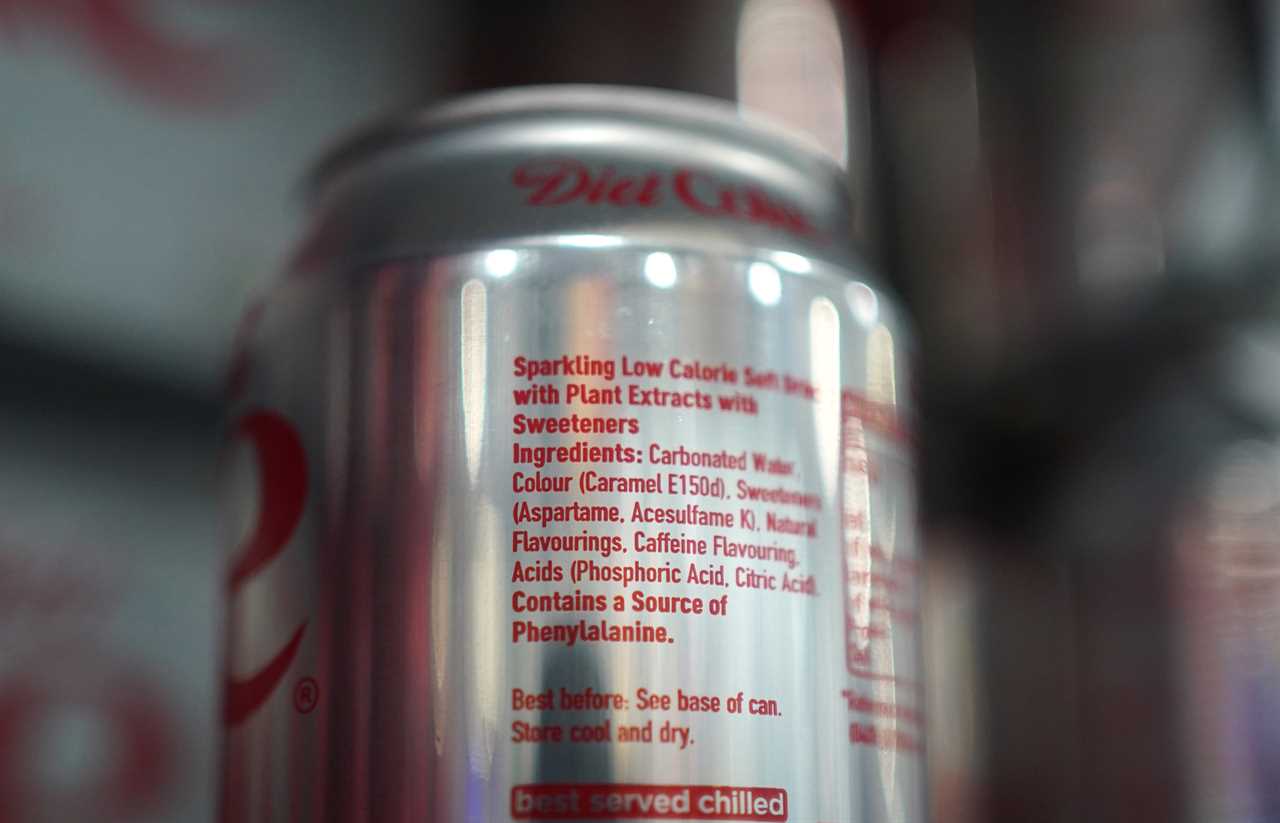AN ARTIFICIAL sweetener used in thousands of products has been ruled a potential cause of cancer by the World Health Organization (WHO).
But just how much aspartame would you have to consume to exceed the recommended limits and put yourself at risk?

Aspartame, found in Diet Coke, is a possible cancer risk, experts say
A panel of experts has said the sugar substitute is safe in limited quantities.
This, they say, works out to be 40mg per kilogram of body weight every day.
A can of diet drink typically contains about 200mg of aspartame.
So someone who weighs 11st (70kg) can consume 14 cans of Diet Coke every 24 hours without surpassing the daily guideline.
However, doctors insist this is not a target and people should not aim to drink that amount as it can cause other problems like teeth erosion.
Dr Duane Mellor, of Aston University in Birmingham, said: “To be clear this is not a recommendation to consume.
“High intakes of any soft drinks, including diet versions containing sweeteners, is likely to lead to less healthy foods being consumed.”
Aspartame is also found in other drinks like Coke Zero, Sprite, Dr Pepper, Fanta Zero, and Lucozade Original.
And it’s an ingredient in Wrigley’s Extra chewing gum, Mullerlight yoghurt, and Hartley’s Sugar Free Jelly.
It is unclear exactly how much aspartame is in these products, but it is frequently listed as less than two per cent of overall ingredients.
The WHO’s International Agency for Research on Cancer (IARC) this week classified aspartame as “possibly carcinogenic to humans”.
Group 2B also includes aloe vera and caffeic acid, found in tea and coffee.
The IARC has two more serious categories, “probably carcinogenic to humans” and “carcinogenic to humans”.
Dr Mary Schubauer-Berigan, of the IARC, said there is “limited evidence” but aspartame has the potential to cause liver cancer.
Dr Francesco Branca, of the WHO’s Department of Nutrition and Food Safety, encouraged people to limit sweetened products if possible.
He said: “We’re not advising consumers to stop consuming (aspartame) altogether, we’re just advising a bit of moderation.
“If consumers are faced with a decision of whether to take cola with sweeteners or with sugar, I think there should be a third option considered, which is to drink water instead.
“There are alternatives that do not contain either free sugars or sweeteners and those should be the products that should be preferred by consumers.”
Widely used as an artificial sweetener since the 1980s, aspartame is used in diet drinks, chewing gum, gelatine, ice cream, dairy products such as yoghurt, breakfast cereals, toothpaste and medications like cough drops and chewable vitamins.
Studies into the possible cancer risks cited “limited evidence” and called for more research into the issue.
The WHO said it and the IARC would continue to monitor evidence and encourage independent research groups.
Harriet Burt, senior policy and international projects officer for World Action on Salt, Sugar & Health based at Queen Mary University of London, said the report emphasised the need for a new approach by food and drink manufacturers.
She said: “This new report from the WHO shows that companies need to reduce the overall sweetness of their products rather than relying so much on sweeteners.
“When done correctly, reformulation can gradually remove excess sugars, salt and saturated fat from foods to improve their overall healthiness without the need for replacement ingredients such as non-sugar sweeteners.”
She continued: “Worryingly, sugar consumption in the UK is still double the recommended levels due to a food system that promotes overconsumption of excessively sweet products high in salt and saturated fat.
“This is why reducing sugar consumption should remain a priority.
“Based on recent WHO reports, it is clear that the UK government urgently needs a comprehensive strategy to reduce not just sugar but overall product sweetness, including the use of non-sugar sweeteners like aspartame.”






